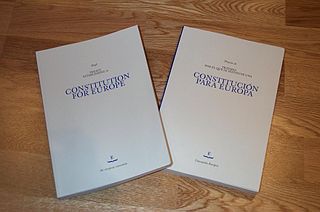Related Research Articles

Liechtenstein is a principality governed under a constitutional monarchy. It has a form of mixed constitution in which political power is shared by the monarch and a democratically elected parliament. There is a two-party system and a form of representative democracy in which the prime minister and head of government is responsible to parliament. However the Prince of Liechtenstein is head of state and exercises considerable political powers.

The Treaty establishing a Constitution for Europe was an unratified international treaty intended to create a consolidated constitution for the European Union (EU). It would have replaced the existing European Union treaties with a single text, given legal force to the Charter of Fundamental Rights, and expanded Qualified Majority Voting into policy areas which had previously been decided by unanimity among member states.
A constitutional amendment is a modification of the constitution of a polity, organization or other type of entity. Amendments are often interwoven into the relevant sections of an existing constitution, directly altering the text. Conversely, they can be appended to the constitution as supplemental additions (codicils), thus changing the frame of government without altering the existing text of the document.

A referendum was expected to take place in the United Kingdom in 2006 to decide whether the country should ratify the proposed Treaty establishing a Constitution for Europe. However, following the rejection of the Constitution by similar referendums in France in May 2005 and the Netherlands in June 2005, the UK vote was postponed indefinitely. The question was rendered moot when the constitution was superseded by the Treaty of Lisbon, which Parliament ratified in 2008 without holding a referendum.

The Single European Act (SEA) was the first major revision of the 1957 Treaty of Rome. The Act set the European Community an objective of establishing a single market by 31 December 1992, and codified European Political Cooperation, the forerunner of the European Union's Common Foreign and Security Policy. It was signed at Luxembourg on 17 February 1986, and at The Hague on 28 February 1986. It came into effect on 1 July 1987, under the Delors Commission.
The Tenth Amendment of the Constitution Act 1987 is an amendment to the Constitution of Ireland that permitted the state to ratify the Single European Act. It was approved by referendum on 26 May 1987 and signed into law on 22 June of the same year.
The Eighteenth Amendment of the Constitution Act 1998 is an amendment of the Constitution of Ireland which permitted the state to ratify the Treaty of Amsterdam. It was approved by referendum on 22 May 1998 and signed into law on the 3 June of the same year. The referendum was held on the same day as the referendum on Nineteenth Amendment, which related to approval of the Good Friday Agreement.
The Twenty-sixth Amendment of the Constitution Act 2002 is an amendment of the Constitution of Ireland which permitted the state to ratify the Treaty of Nice. It was approved by referendum on 19 October 2002 and signed into law on 7 November of the same year. The amendment followed a previous failed attempt to approve the Nice Treaty which was rejected in the first Nice referendum held in 2001.

This is a list of referendums related to the European Union, or referendums related to the European Communities, which were predecessors of the European Union. Since 1972, a total of 48 referendums have been held by EU member states, candidate states, and their territories, with several additional referendums held in countries outside of the EU. The referendums have been held most commonly on the subject of whether to become a member of European Union as part of the accession process, although the EU does not require any candidate country to hold a referendum to approve membership or as part of treaty ratification. Other EU-related referendums have been held on the adoption of the euro and on participation in other EU-related policies.

A consultative referendum on the Treaty establishing a Constitution for Europe was held in the Netherlands on 1 June 2005 to decide whether the government should ratify the proposed Constitution of the European Union. The result was a "No"-vote.
The Luxembourgish referendum on the Treaty establishing a Constitution for Europe is a referendum that was held on 10 July 2005 to decide whether Luxembourg should ratify the proposed Constitution of the European Union.

The French referendum on the Treaty establishing a Constitution for Europe was held on 29 May 2005 to decide whether France should ratify the proposed Constitution of the European Union. The result was a victory for the "No" campaign, with 55% of voters rejecting the treaty on a turnout of 69%.
The Irish referendum on the Treaty establishing a Constitution for Europe was a vote that was planned but did not occur. The referendum was expected to take place in 2005 or 2006 to decide whether Ireland should ratify the proposed EU Constitution. Following the rejection of the Constitution by voters in the French referendum of May 2005 and the Dutch referendum of June 2005, the planned Irish referendum was postponed indefinitely.
The Twenty-fourth Amendment of the Constitution Bill 2001 was a proposed amendment to the Constitution of Ireland to allow the state to ratify the Treaty of Nice of the European Union. The proposal was rejected in a referendum held on June 2001, sometimes referred to as the first Nice referendum. The referendum was held on the same day as referendums on the prohibition of the death penalty and on the ratification of the Rome Statute of the International Criminal Court, both of which were approved.

The ratification of the Treaty of Lisbon was officially completed by all member states of the European Union on 13 November 2009 when the Czech Republic deposited its instrument of ratification with the Italian government. The Lisbon Treaty came into force on the first day of the month following the deposition of the last instrument of ratification with the government of Italy, which was 1 December 2009.
A referendum is a direct vote in which an entire electorate is asked to either accept or reject a particular proposal. This article summarises referendum laws and practice in various countries.

The European Union Bill 2004–05 was a bill of the United Kingdom Parliament which proposed to ratify the European Constitution and to incorporate it into the domestic law of the United Kingdom and to amend the European Communities Act 1972 to include it in the list of Treaties and hold a referendum throughout the United Kingdom and Gibraltar on whether to approve the proposed Constitution which would be overseen by the Electoral Commission.
The Opposition Agreement was a political agreement between two major parties in the Czech Republic, the Czech Social Democratic Party (ČSSD) and the Civic Democratic Party (ODS). ČSSD was allowed to govern alone while ODS received a number of parliamentary posts and the two parties together adopted several constitutional amendments. It was signed by Miloš Zeman and Václav Klaus on 8 July 1998.
Euroscepticism, i.e. the opposition to policies of supranational European Union institutions and/or opposition to membership of the European Union, is a significant element in the politics of the Czech Republic, with several parties and political figures favouring leaving the union. According to a survey by CVVM in April 2016, 25% of Czechs were satisfied with European Union membership.

The European Union Withdrawal Agreement Bill 2017–19 is a private member's bill of the Parliament of the United Kingdom to make provision for the holding of a “public vote” (referendum) in the United Kingdom and Gibraltar following the conclusion of negotiations by Her Majesty's Government and the European Union on whether to support the proposed exit deal for the United Kingdom's Withdrawal from the European Union or to remain a member state of the EU. The bill is sponsored by English Labour Co-operative MP Gareth Thomas.
References
- ↑ "EU schvaluje ústavu, Česko rozdělila". iDNES.cz. 11 January 2005. Retrieved 14 March 2017.